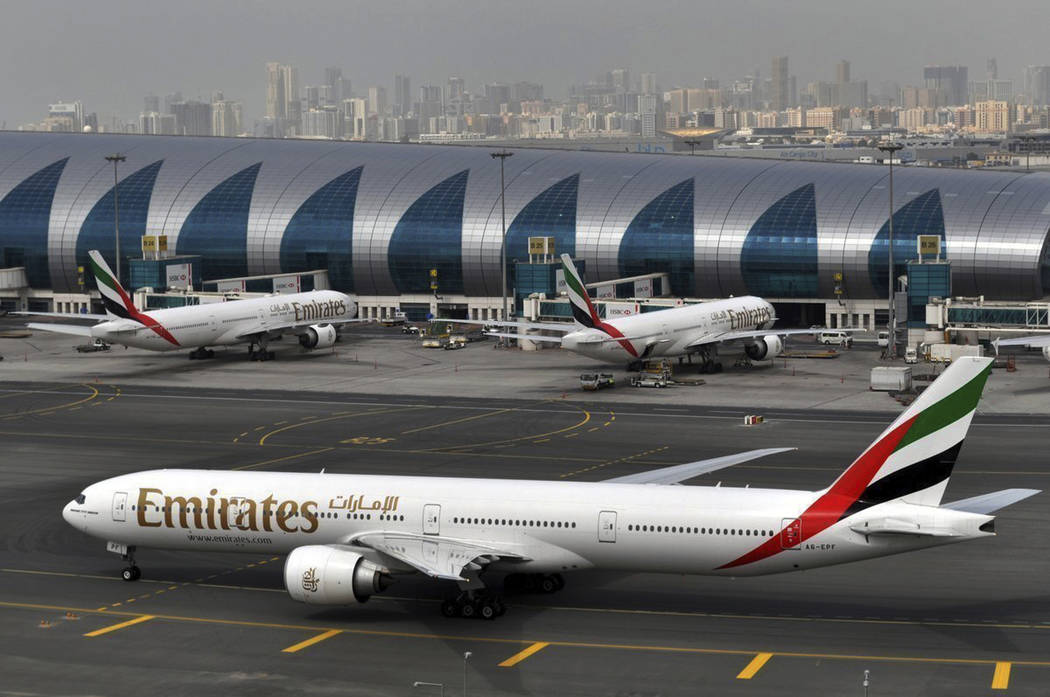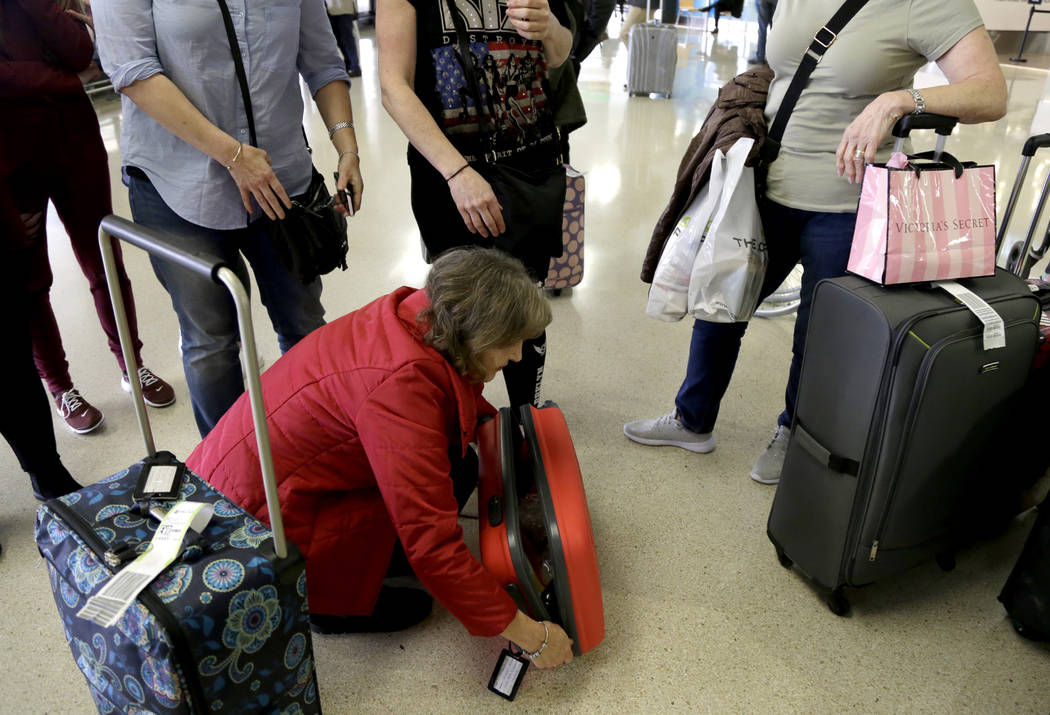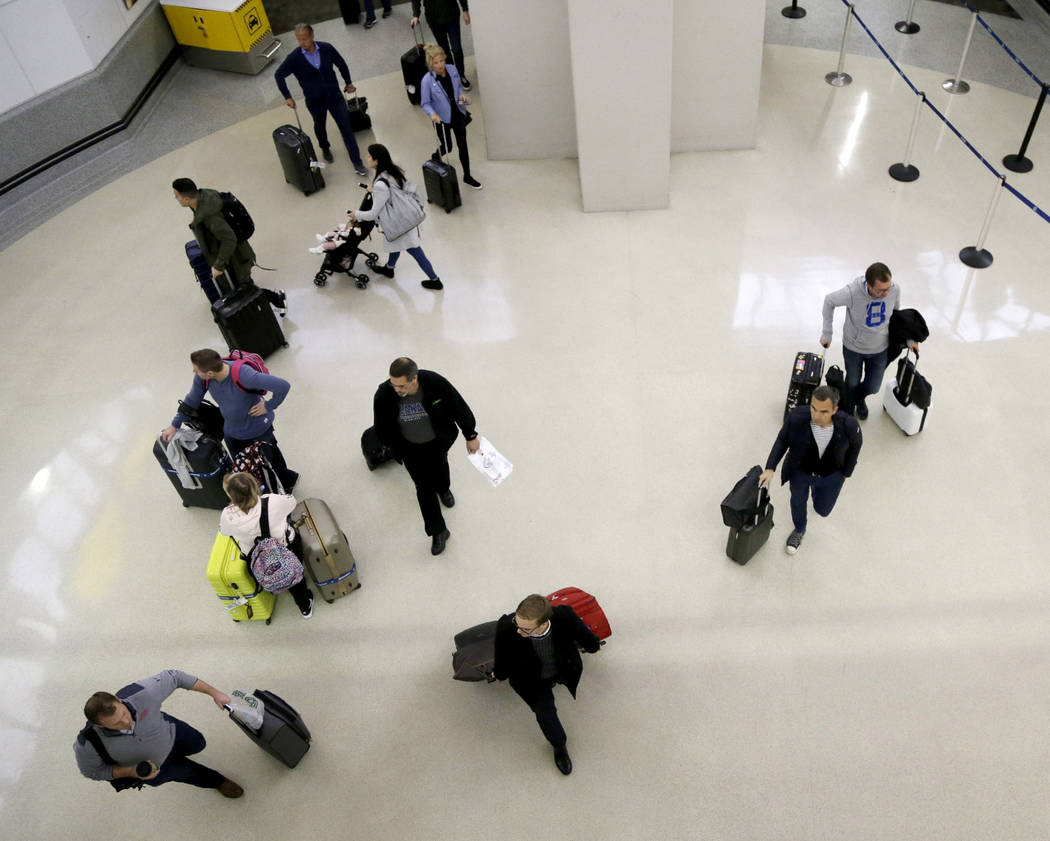New security screenings begin for passengers on US-bound flights
DUBAI, United Arab Emirates — New security screenings for all passengers on U.S.-bound flights began on Thursday, with airlines worldwide questioning flyers about their trip and their luggage in the latest Trump administration decision affecting global travel.
However, confusion still remains about the new regulations, which come at the end of a 120-day period following the United States lifting a ban on laptops in airplane cabins affecting 10 Mideast cities. The new regulations cover all the 2,100 flights from around the world entering the U.S. on any given day.
Some airlines said they had received permission to delay implementing the new rules until January.
At Dubai International Airport, the world’s busiest for international travel, long-haul carrier Emirates began questioning passengers about their luggage, liquids they were carrying and where they were coming from. Passengers also had to have their carry-on bags searched, along with their electronics.
Emirates declined to discuss the new procedures in detail on Thursday. On Wednesday, it said it would conduct “passenger pre-screening interviews” for those traveling on U.S.-bound flights in concert with other checks on electronics.
Elsewhere, things did not appear to be going so smoothly. In China, an official in the Xiamen Airlines press office, who would only give his surname as Qiu, said that the airlines received a “demand” about the new U.S. regulations and planned “to take some security measures, including security safety interviews from today on.”
“We’re not going to interview all passengers, but focus on those with a certain degree of risk when checking the passengers’ documents on the ground,” he said, without elaborating.
An official with the Eastern Airlines publicity department said that she saw media reports about security safety interviews but didn’t have immediate details on what her company was doing. An official at the Beijing Airport press center would only say: “We always strictly follow relevant regulations of the Civil Aviation Administration when conducting security checks.” Both officials spoke on condition of anonymity under regulations.
Joel Chusid, executive director of Hainan’s operations in the United States, said secondary checks have already been in place for flights out of China to the U.S.
Thus, people flying to Las Vegas from Beijing this week will not see anything different, he said.
”This has been in place for years,” said Chusid. ”They are fairly strict in Beijing. You can’t even bring an umbrella on the plane.”
Hainan launched Beijing-Las Vegas flights last December.
Delaying implementation
South Korea’s Transport Ministry said that the United States agreed to delay implementing the new screening for the country’s two biggest carriers, Korean Air Lines Co. and Asiana Airlines Inc., until next year on condition they deploy staff at boarding gates to monitor travelers.
Royal Jordanian, based in Amman, also has said it would introduce the new procedures in mid-January.
Other airlines with U.S.-bound flights at Seoul’s Incheon International Airport brought in as many as seven extra staff Thursday to question passengers under the new rules but there were no major delays, airport spokesman Lee Jung-hoon said.
Singapore Airlines passengers may be required to “undergo enhanced security measures” including inspection of personal electronic devices “as well as security questioning during check-in and boarding,” the carrier said on its website.
Other carriers who announced the new regulations on Wednesday included Air France, Hong Kong-based Cathay Pacific Airways Ltd., the airlines of Germany’s Lufthansa Group and EgyptAir.
Aviation analyst Mike Boyd, president of Boyd Group International, praised the changes.
“There are a lot of terrorists out there that aren’t cold stone. You can ferret those people out” through these additional measures.
“It will be another layer of awareness. This is a positive thing. The travel industry should be cheering this and not keeping silent. This is another factor that keeps them and their airplanes safe.”
“It is not going to be chaos at the airport in any way, shape or form [from these security measures.’
‘A little annoying’
In Hong Kong, passengers described some of the questions they were asked.
“They asked me if I packed my own bag, where I packed it from, where I came from, they looked at my itinerary, verify where I was, who I was, from where I came from,” said Fran Young, who was traveling to Los Angeles.
Some showed displeasure.
“It’s a little inconvenient, I kind of just want to get my printed ticket and then just go inside,” passenger Gavin Lai said. “I don’t want to wait on people to interview me like that. So it’s a little annoying.”
U.S. carriers also will be affected by the new rules. Delta Air Lines said it was telling passengers traveling to the U.S. to arrive at the airport at least three hours before their flight and allow extra time to get through security. United declined to comment, while American did not immediately respond to a request for comment.
Review-Journal writer Todd Prince contributed to this report.
Laptop ban
In March, U.S. officials introduced the laptop ban in the cabins of some Mideast airlines over concerns Islamic State fighters and other extremists could hide bombs inside of them. The ban was lifted after those airlines began using devices like CT scanners to examine electronics before passengers boarded planes heading to the U.S. Some also increasingly swab passengers' hands to check for explosive residue.
The laptop ban as well as travel bans affecting predominantly Muslim countries have hurt Mideast airlines. Emirates, the region's biggest, said it slashed 20 percent of its flights to the U.S. in the wake of the restrictions.
























